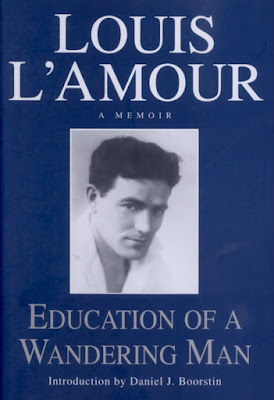Louis L'Amour: Education of a Wandering Man
 Education of a Wandering Man: A Memoir
Education of a Wandering Man: A MemoirBy Louis L’Amour
Bantam Books; $25.00, cloth
ISBN 978-0-553-05703-4
My generation is most likely the last one to idolize cowboys. Television shows like Gunsmoke, The Lone Ranger, Big Valley and The Rifleman were must-see programs. I strapped on my six gun and copied what I saw on the old black and white TV set in the living room.
As I grew older, I became uncomfortable acting out such childhood fantasies. I ditched the western wear for Louis L’Amour novels. I read at the rate of ten books a week, plowing through a veritable forest of paper, soaking up the lore of the west at the hands of one of the most prolific writers. L’Amour died in 1988, yet his novels, short fiction, and poetry continue to hit the book store shelves. He said that he could write anywhere with his typewriter balanced on his knees. He did not understand the concept of writer’s block. His novels were usually short with lots of action, sometimes a rather clumsy love story, and often a plethora of historical detail that L’Amour researched and often lived through himself.
So it was with great anticipation that I stumbled upon his memoirs in hardback. Education of a Wandering Man details L’Amour’s autodidactic pursuits and his reading was deep and broad. He left school in the tenth grade to wander the world, working a variety of jobs that would later furnish important details for his stories. L’Amour recounts how he collected many of the books that most influenced his life, books he once borrowed from libraries or found during his travels.
L’Amour’s work is a treasure. His writing displays the kind of storytelling that infuses his novels, but here he explains what made him a reader and writer. Whereas the stories of the west once fueled my imagination, the life of the writer now interests me more, so reading L’Amour’s book was like visiting a candy store or getting drunk on the sweetest wine.
L’Amour discusses not only his own work, but the writers who most influenced him. In fact, the majority of this book is about his reading life. He believes that a good writer begins life as an avid reader, and that to read broadly is what makes someone a good storyteller.
The book also details the research that L’Amour did. Literally, he immersed himself in the west. He lived his stories, and whenever possible, he trekked across the United States following his characters’ lives as they would have lived them. Along the way, he amassed tons of facts and stories. His meticulous research adds veracity to his work. L’Amour is an historian wrapped in the cloak of a pulp fiction writer.
Included in this cloth edition is Daniel Boorstin’s introduction and a variety of photographs from L’Amour’s archives, as well as his reading lists from his journals and notebooks. This makes for a valuable bibliography for writing students.
Many of the writers I read as a kid do not hold up to rereading. I have purchased many of those books simply to have them on my shelves, testimony to where I began as a reader. It is unusual to find writers from childhood offering something to an adult reader. I will leaf through a Louis L’Amour western now and again in my attic, but Education of a Wandering Man will take its place on my shelf in the study.
As a young boy, I read through those hot summer nights with Louis L’Amour westerns. I dreamed of six guns and wild west adventures. Now as a middle-aged writer, I can appreciate the origins of the story, the writer as reader and student of life, offering me another perspective on an author I once loved in another time.


Comments
Post a Comment